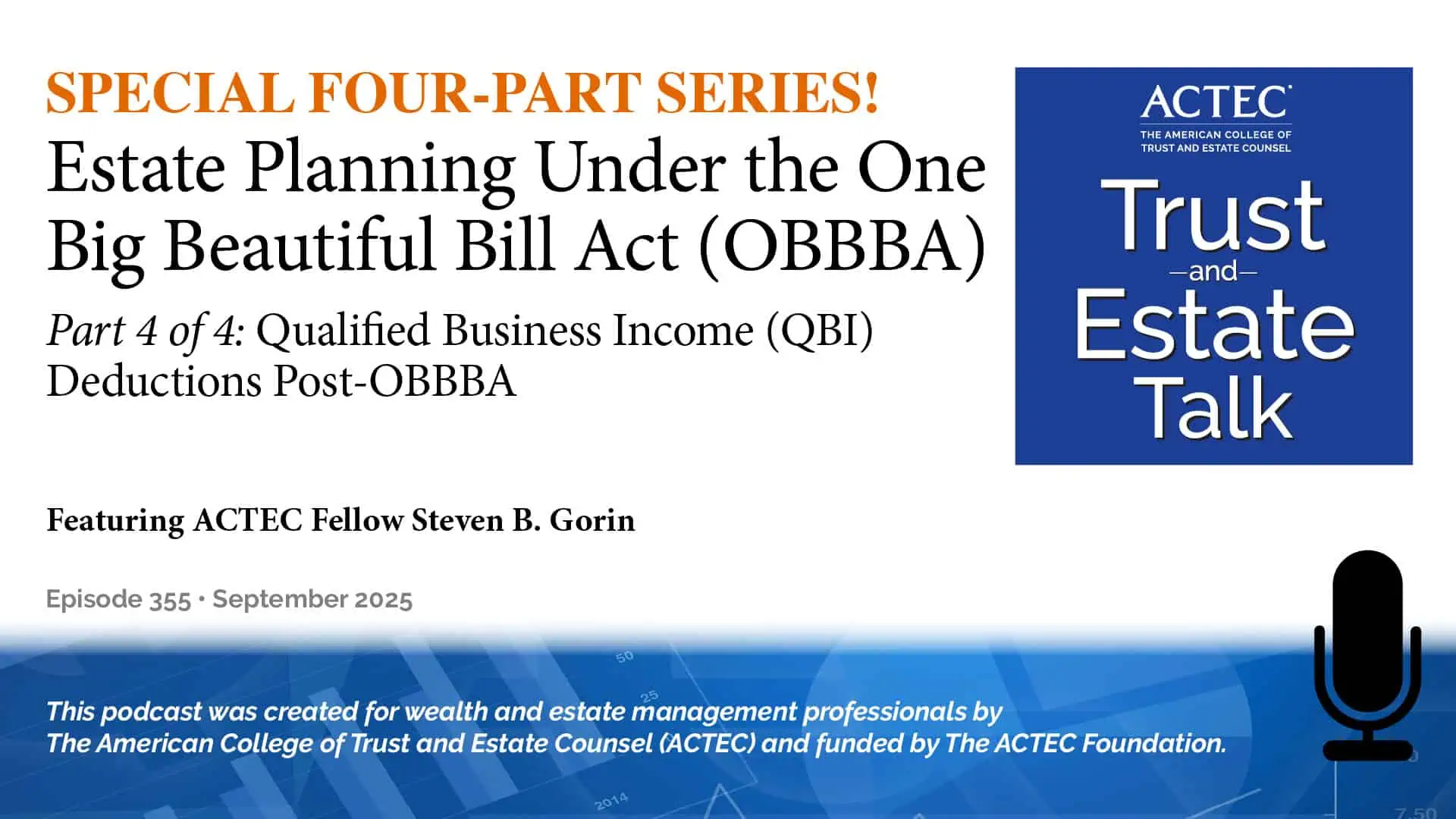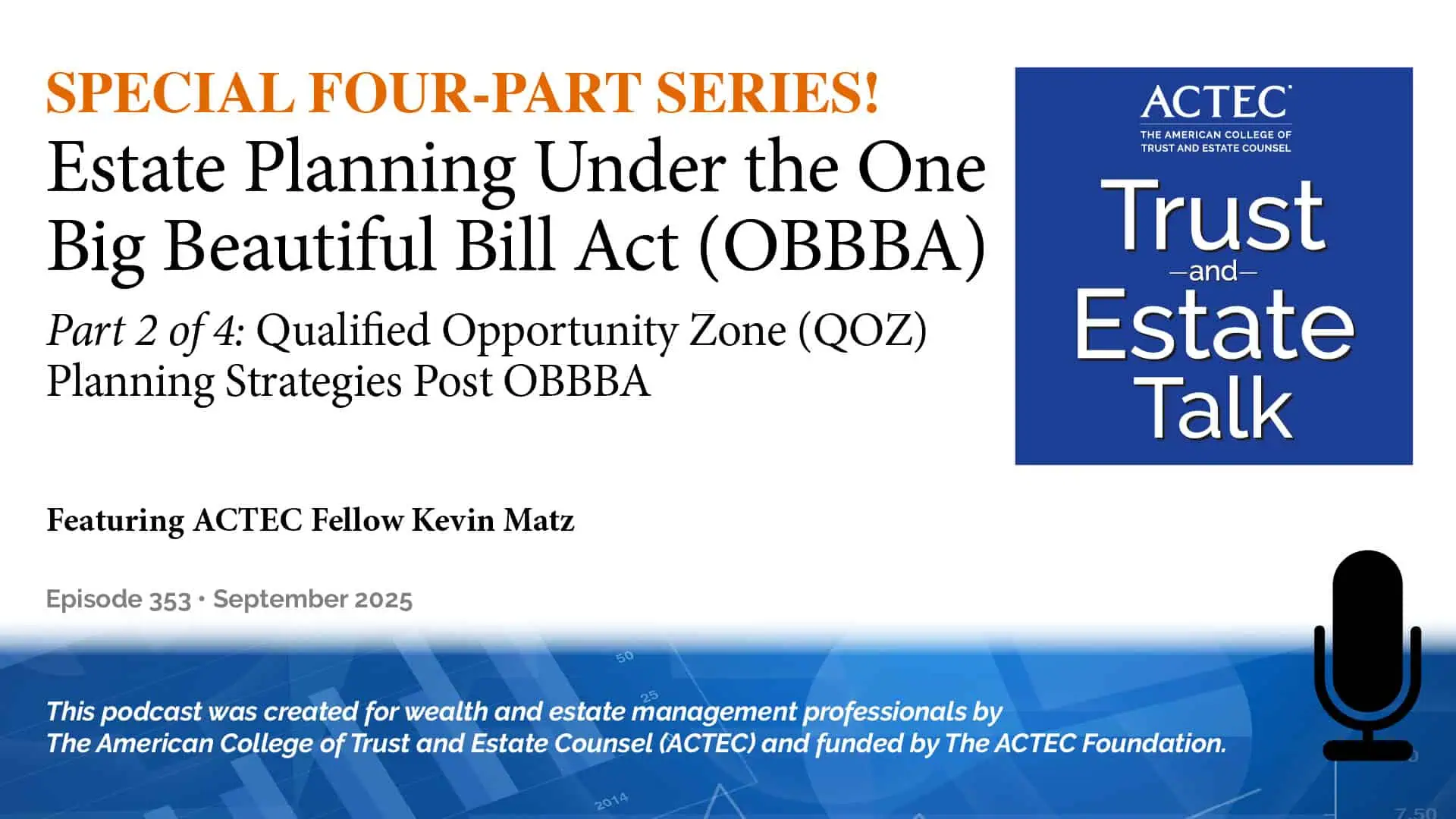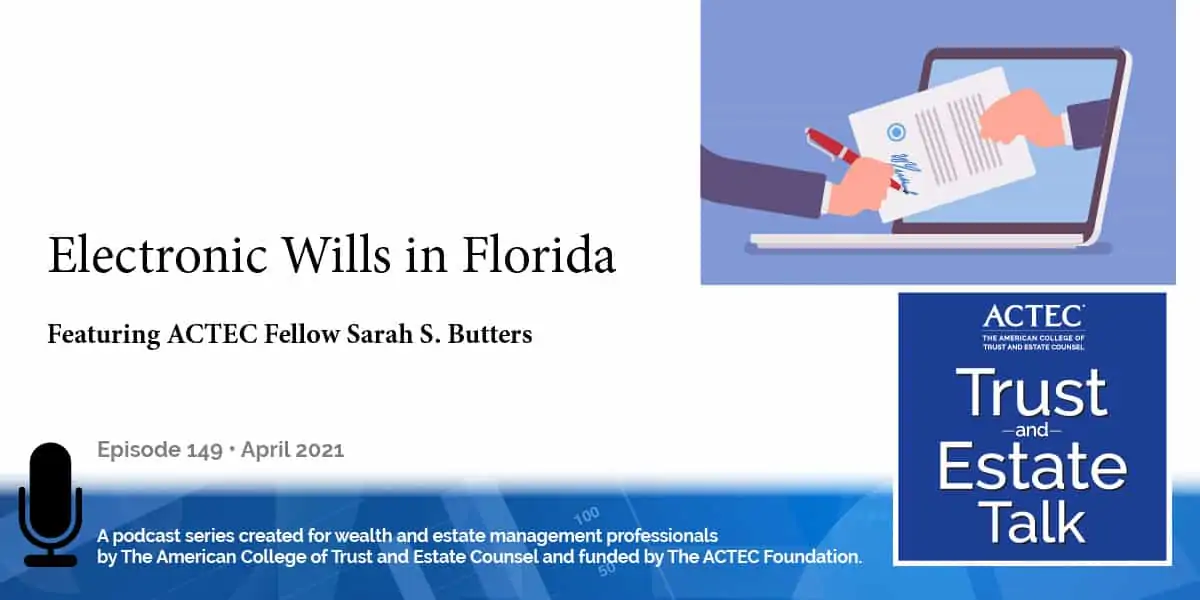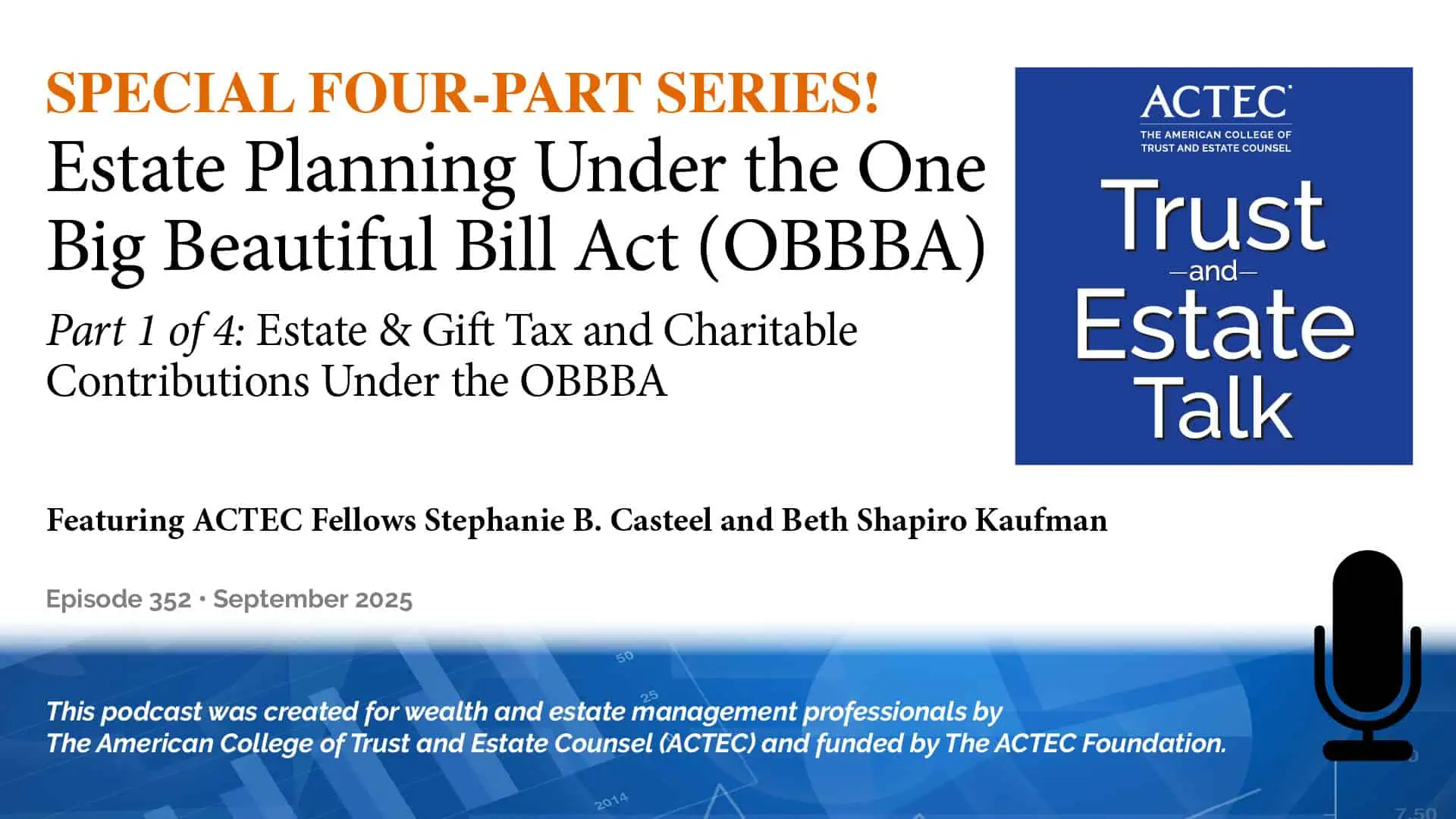Electronic Wills in Florida
“Electronic Wills in Florida,” that’s the subject of today’s ACTEC Trust and Estate Talk.
Transcript/Show Notes
This is Travis Hayes, ACTEC Fellow from Naples, Florida. Florida became one of the first states to enact electronic wills legislation, which became effective on July 1, 2020. To discuss what has and hasn’t worked with the new Florida legislation, you’ll be hearing today from ACTEC Fellow Sarah Butters, of Tallahassee, Florida. Welcome, Sarah.
Hi. Thank you for that introduction. Here we are in the spring of 2021, which is about the one-year anniversary of the COVID pandemic lockdown. And fortunately for Florida, we had electronic wills legislation pass in the spring of 2019 to become effective in the year of 2020. And so, fortunately for Florida, as soon as the pandemic happened, we actually had remote notarization already in place. And the idea that you could electronically execute estate plans was coming shortly thereafter, effective as of July 1 of 2020.
Reflection After Nine Months of the Florida Electronic Wills Legislation
And so, we’ve had in Florida, as of the time of this recording, about nine months to use the electronic wills legislation in Florida during a particularly unique time in history when we are all still working remotely and trying to do as much as we can through the electronic format. And so, Florida, as of July 1, 2020, has had the ability to remotely notarize documents and specifically remotely notarize electronic estate planning documents.
And when we talk about estate planning documents, we mean wills, trusts, those documents that are testamentary in nature as well as durable powers of attorney, health care surrogates and living wills. But because a lot of these documents do not become effective or that we don’t need to necessarily use them until someone has either lost their mental capacity or is deceased, Florida has specific safeguards in place that are separate and distinct from electronic documents – remote notarization generally.
And so, what Florida has put in place with respect to these types of estate planning documents are two primary safeguards to make sure that the electronic estate planning type documents are executed in the safest manner possible and stored in the safest manner possible. So, the current electronic wills legislation has safeguards against certain types of vulnerable persons executing these types of documents outside of the physical presence of witnesses.
So, you can, under all circumstances, do an electronic estate planning document in the state of Florida. But whether those witnesses can appear remotely via some sort of audio/video communication, like Zoom or Skype or FaceTime, depends on whether the person executing those documents is classified as a vulnerable adult. What we mean, in Florida, by vulnerable adult – that is a defined term under our statute– is generally someone who needs assistance with daily care because of some mental, physical disability or some infirmity of aging.
The problem with that definition is it’s pretty broad in scope, and we don’t have a ton of case law guidance to tell us exactly the nuances of who is and isn’t a vulnerable adult. Obviously, someone who is in assisted living, nursing care, or receives at-home nursing assistance is a vulnerable adult. They are placed in these facilities or they are receiving home health care aid because they need that assistance. Those are sort of the obvious vulnerable adults.
What’s not so obvious about defining vulnerable adults are sort of other folks. I happen to wear bifocals. It is, clearly, an infirmity of aging. Does it impair my ability to perform daily tasks? Probably not significantly – not to the point that I couldn’t function if I didn’t have my glasses for a day. I can feed myself. I can bathe myself. But you can see where the argument could be made that the need for hearing aids, eyeglasses, those sorts of assistance could render someone more vulnerable than others. And so, we don’t have clear guidance on what a vulnerable adult is.
But what we do know, and what is clear under the statute is if you are a vulnerable adult, you may not execute estate planning documents electronically unless you have witnesses who are physically present in the room with you when you sign. So, you may do an electronic document, but you cannot use remote witnessing. You have to have the witnesses be physically present with you. And that is an absolute barrier to the validity of your documents.
In other words, if you are a vulnerable adult, and you mistakenly execute an estate planning document without witnesses physically present, your documents are void – not voidable. And that’s a pretty dire consequence that people really need to consider when they’re trying to use these documents. So, we have had practitioners desperate in the COVID situation to get documents signed remotely that, perhaps, don’t recognize the vulnerability that those documents might have to being challenged because the particular principal was, in fact, a vulnerable adult and didn’t necessarily self-identify that way.
And so, that’s proven to be one of the barriers to people using these electronic documents right now because we don’t have clear enough guidance on who is and who is not a vulnerable adult. So, don’t necessarily want to risk it; figuring out that someone was, in fact, a vulnerable adult after the fact, and their documents are now deemed void.
So, the vulnerable adult component of Florida’s e-wills, while it’s well intended and was designed to protect vulnerable persons and our elderly population from being exploited, has turned out to be one of the barriers to a more prolific use of electronic wills in Florida. But I think that the solution is not to necessarily remove that protection but to get better guidance, better education on who is and is not a vulnerable adult so that people are not unwittingly using this without the knowledge about the risk involved.
The second component of Florida’s electronic wills legislation that’s rather unique to Florida, as compared to the proposed Uniform Act (Electronic Wills Act) and other acts that we’ve seen, is that Florida has robust protections regarding who can store this electronic record and what safeguards are in place for storage because, again, we won’t probably need to use these documents until someone is either incapacitated or someone is deceased. And so, we want to be sure that the documents, while they are stored, are not tampered with or not altered in any way.
Qualified Custodian of Electronic Estate Planning Documents
And so, Florida requires that for electronic estate planning documents to be probated with the court that they must be stored by a qualified custodian. Again, that qualified custodian is a defined term under our statutes. And what a qualified custodian essentially has to do is meet a series of qualifications. Must be a resident of the state of Florida or a corporation domiciled in the state of Florida. Must post a fiduciary bond to protect against loss or damage if the record is lost in some way. Must also meet some other certain data safeguard requirements that the record is stored in a manner that’s tamper evident. Those sorts of things.
And so, it’s critical to the record being readily usable, from an evidentiary perspective, for admission to probate requires that the record be stored by a particular type of custodian – not a notary, generally, but a notary who is also a qualified custodian, has posted the necessary bond, has checked the required boxes.
So, the qualified custodian component is also proving to be a little bit difficult in Florida. It’s a unique type of bond that a lot of bonding and surety companies are trying to design a product around. And so, we have not seen a lot of qualified custodians actually posting the bond yet. There’s also just a lot of misinformation or un-education about who can store.
And so, many times, the notary who typically would store all other types of transactional documents doesn’t necessarily recognize that they have to take some extra steps to be able to store electronic estate planning documents. So, what we’ve seen is notarizing of these electronic estate planning documents and storing them without realizing that they’re not qualified custodians. The ramification of that – of having an electronic estate planning package – the video, the document – stored by someone who is not a qualified custodian is that you effectively wreck the self-proving aspects of that record.
And so, what you would ultimately have to do in the future to probate a will that has not been stored by a qualified custodian is you would have to go and get the witness or the notary to prove up that electronic record. And that testimony would look something like what you do right now, in terms of proving a will that is not self-proved. Testimony that it was signed properly, testimony that the requirements of the statute were met, but also some testimony that there has not been any tampering with the record.
And so, you can imagine in the estate planning context how difficult it already is sometimes to track down witnesses to wills ten years after the fact. It’s probably going to be even more difficult to track down witnesses to a will when that witness was a virtual witness – was not someone like a neighbor, an employee of the law firm, or there’s no personal connection to this person who was simply Skyped in through an electronic medium through the dot-com company that you used. So, the idea of not storing an electronic record with a qualified custodian could really lead to some evidentiary problems, in terms of trying to get that will admitted down the line.
And so, Florida is working on clarifying our statutes. There are a couple of bills in the Florida legislative session right now that are working on clarifying who can store and who is fixing some glitches in the legislation. But there’s also a huge push to just plain educate notaries and the general public about this e-wills legislation – the protections, the safeguards that are in place, and making sure that it’s complied with properly so that e-wills will be something that practitioners in the state of Florida can eventually embrace and have confidence using down the line.
So, that’s the e-wills update in Florida, as of the spring of 2021. And, hopefully, we’ll have much more to report on in the months to come after our Florida legislative session has concluded their work in May. So, thank you for listening. And feel free to contact me if you have any specific questions about Florida’s legislation or the process of how that legislation has evolved. Thank you for your time.
Thank you, Sarah, for updating us on the Florida electronic wills legislation.
You may also be interested in An Update on Electronic Wills Statutes.
This podcast was produced by The American College of Trust and Estate Counsel, ACTEC. Listeners, including professionals, should under no circumstances rely upon this information as a substitute for their own research or for obtaining specific legal or tax advice from their own counsel. The material in this podcast is for information purposes only and is not intended to and should not be treated as legal advice or tax advice. The views expressed are those of speakers as of the date noted and not necessarily those of ACTEC or any speaker’s employer or firm. The information, opinions, and recommendations presented in this Podcast are for general information only and any reliance on the information provided in this Podcast is done at your own risk. The entire contents and design of this Podcast, are the property of ACTEC, or used by ACTEC with permission, and are protected under U.S. and international copyright and trademark laws. Except as otherwise provided herein, users of this Podcast may save and use information contained in the Podcast only for personal or other non-commercial, educational purposes. No other use, including, without limitation, reproduction, retransmission or editing, of this Podcast may be made without the prior written permission of The American College of Trust and Estate Counsel.
If you have ideas for a future ACTEC Trust & Estate Talk topic, please contact us at ACTECpodcast@ACTEC.org.
© 2018 – 2025 The American College of Trust and Estate Counsel. All rights reserved.
Latest ACTEC Trust and Estate Talk Podcasts

Qualified Business Income (QBI) Deductions Post-OBBBA
Learn how the One Big Beautiful Bill Act changes the Qualified Business Income (QBI) Deduction, expanding phase-in ranges and tax planning opportunities.

How the OBBBA Impacts Qualified Small Business Stock (QSBS)
Explore OB3 Act changes to QSBS rules, including the new $75M limit, $15M exclusion, and strategies to maximize tax savings for founders and investors.

Qualified Opportunity Zone (QOZ) Planning Strategies Post OBBBA
Discover how the One Big Beautiful Bill Act reshapes Qualified Opportunity Zones, estate planning rules, and tax strategies for investors.



